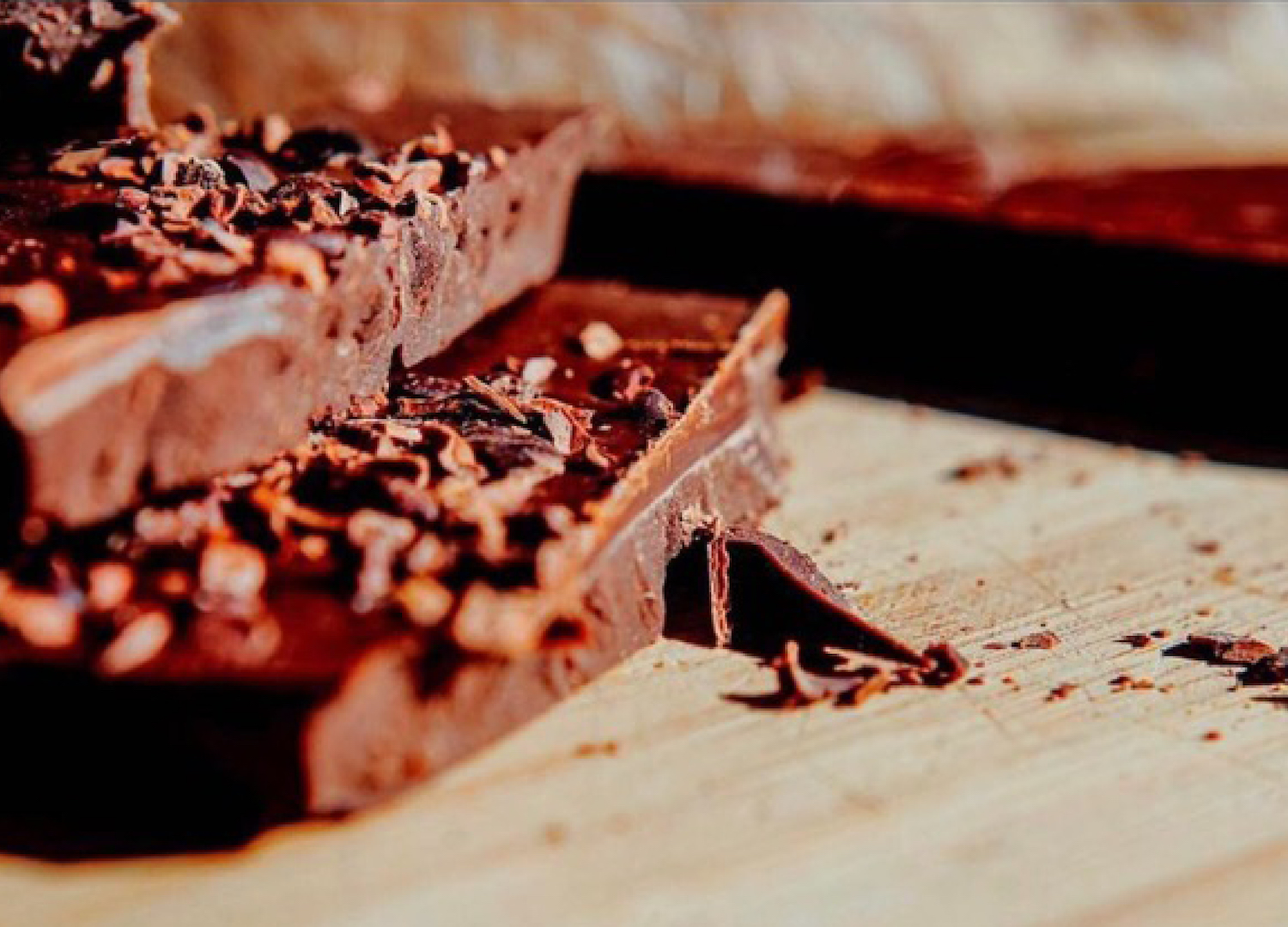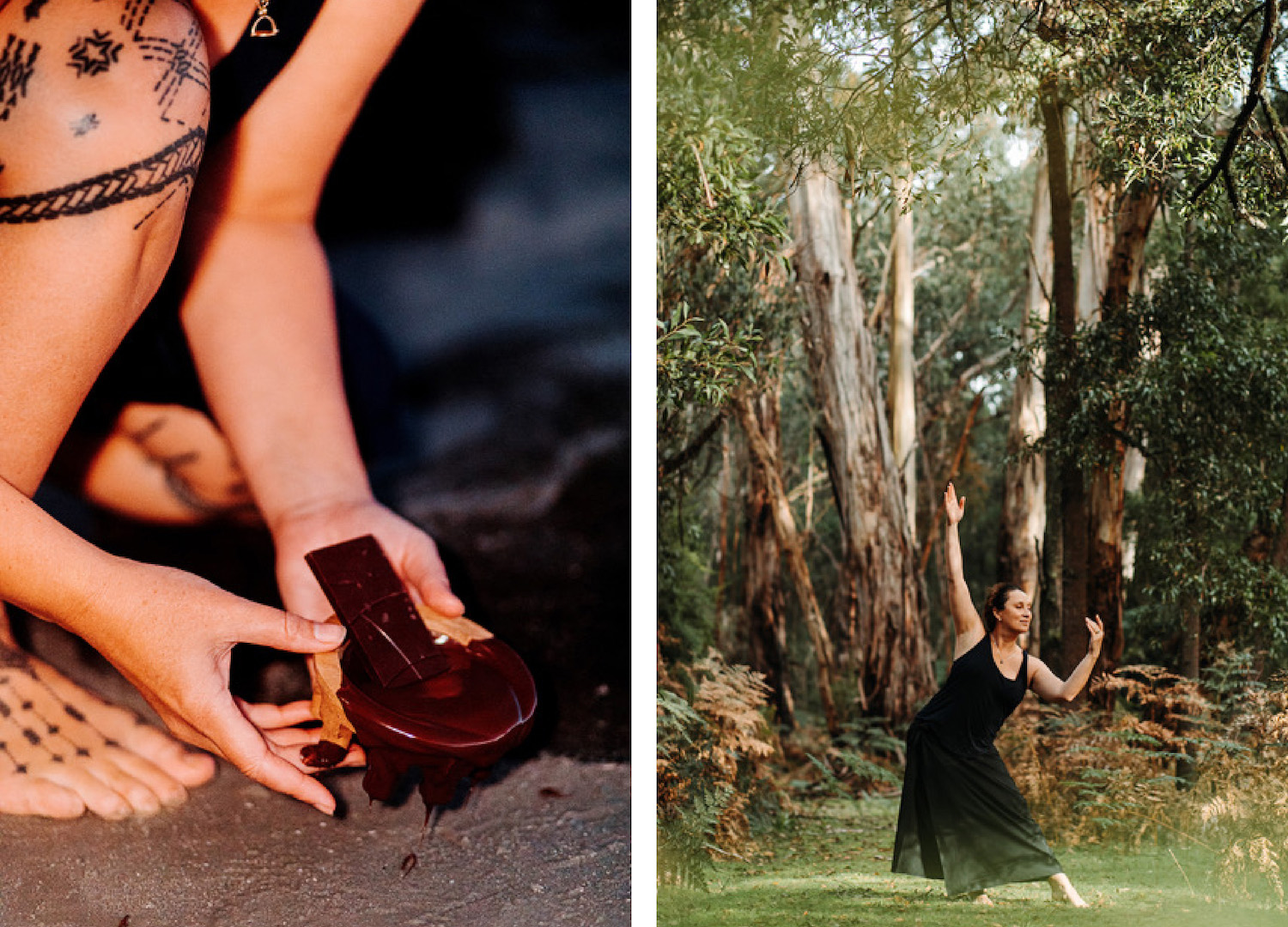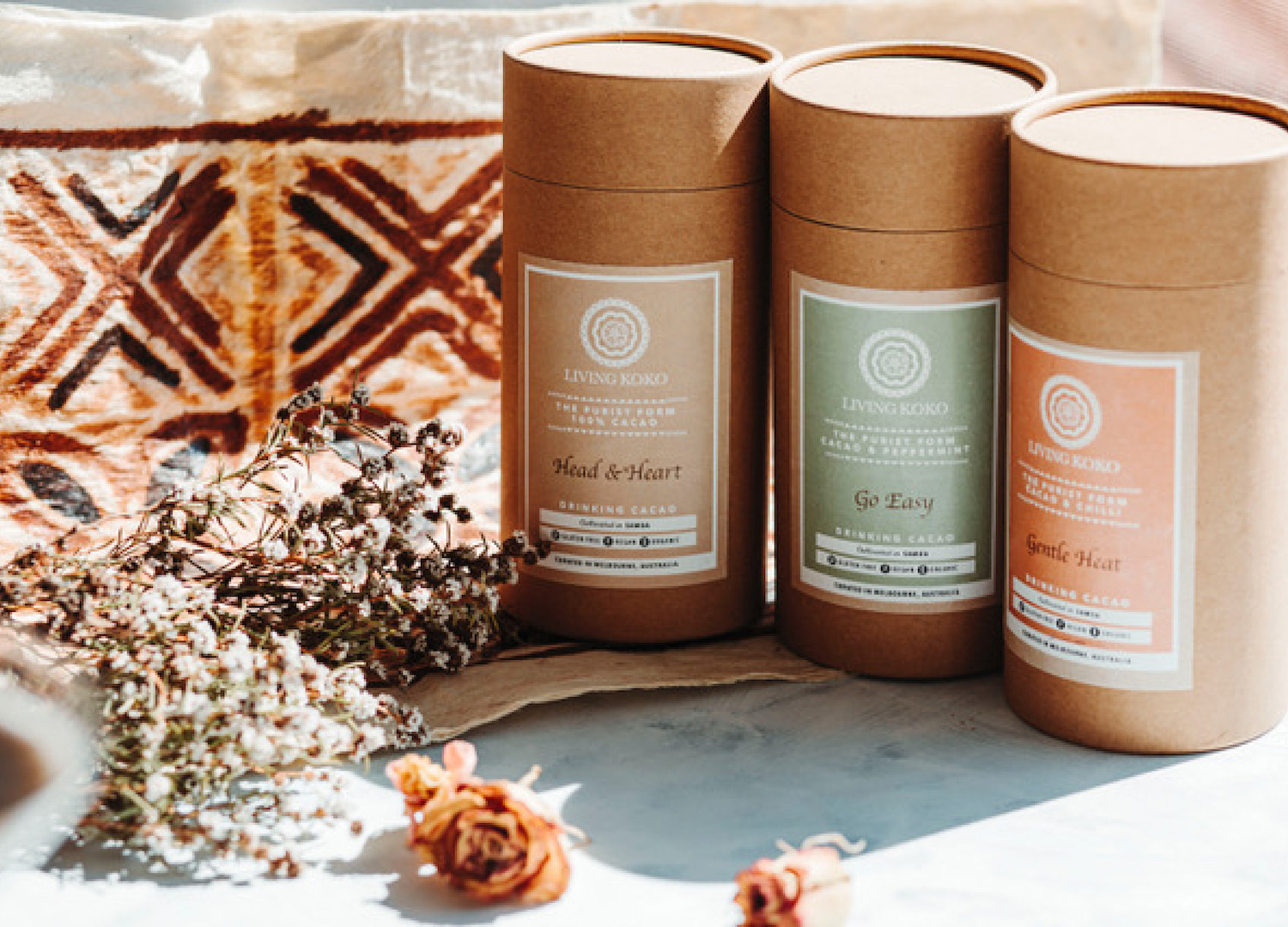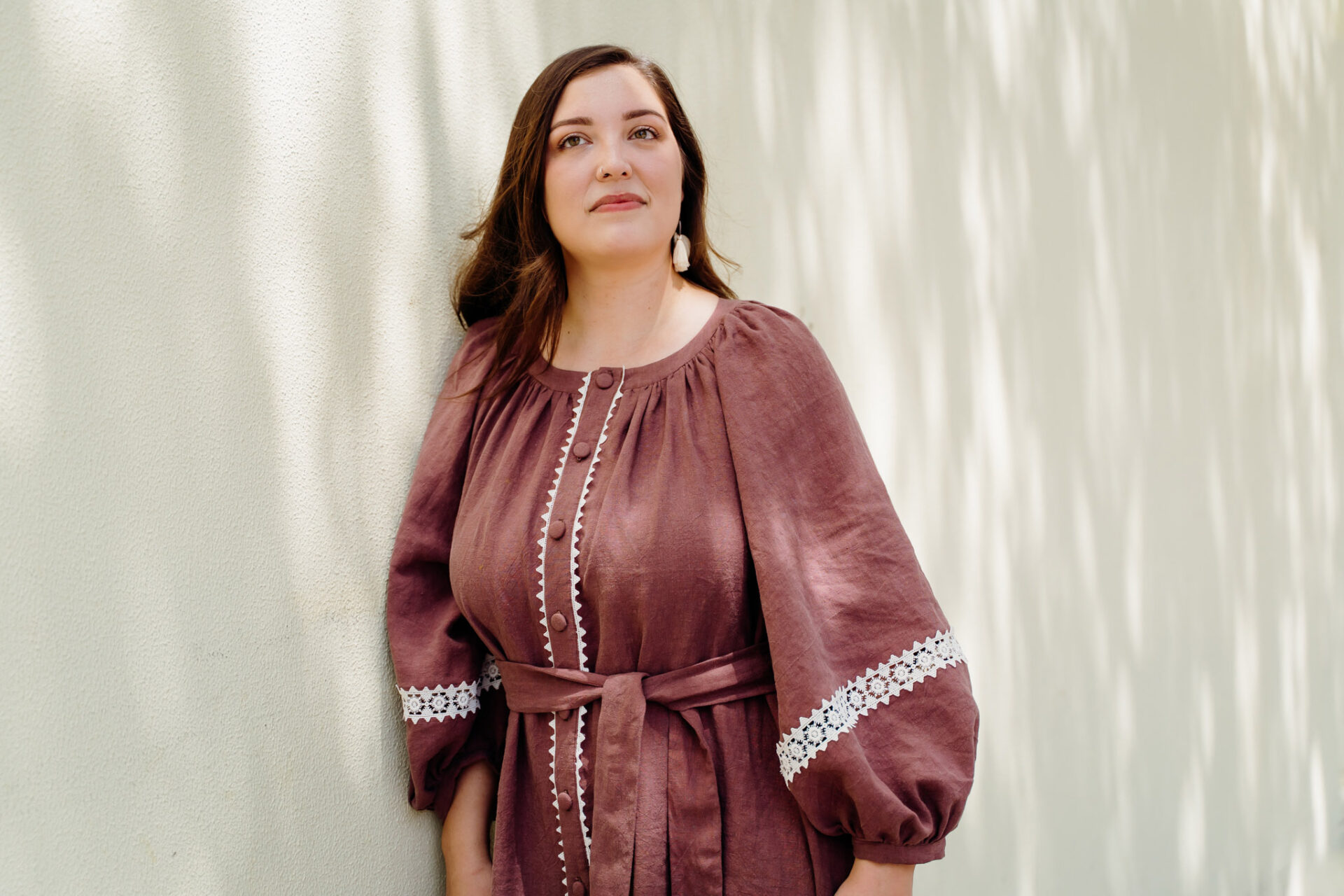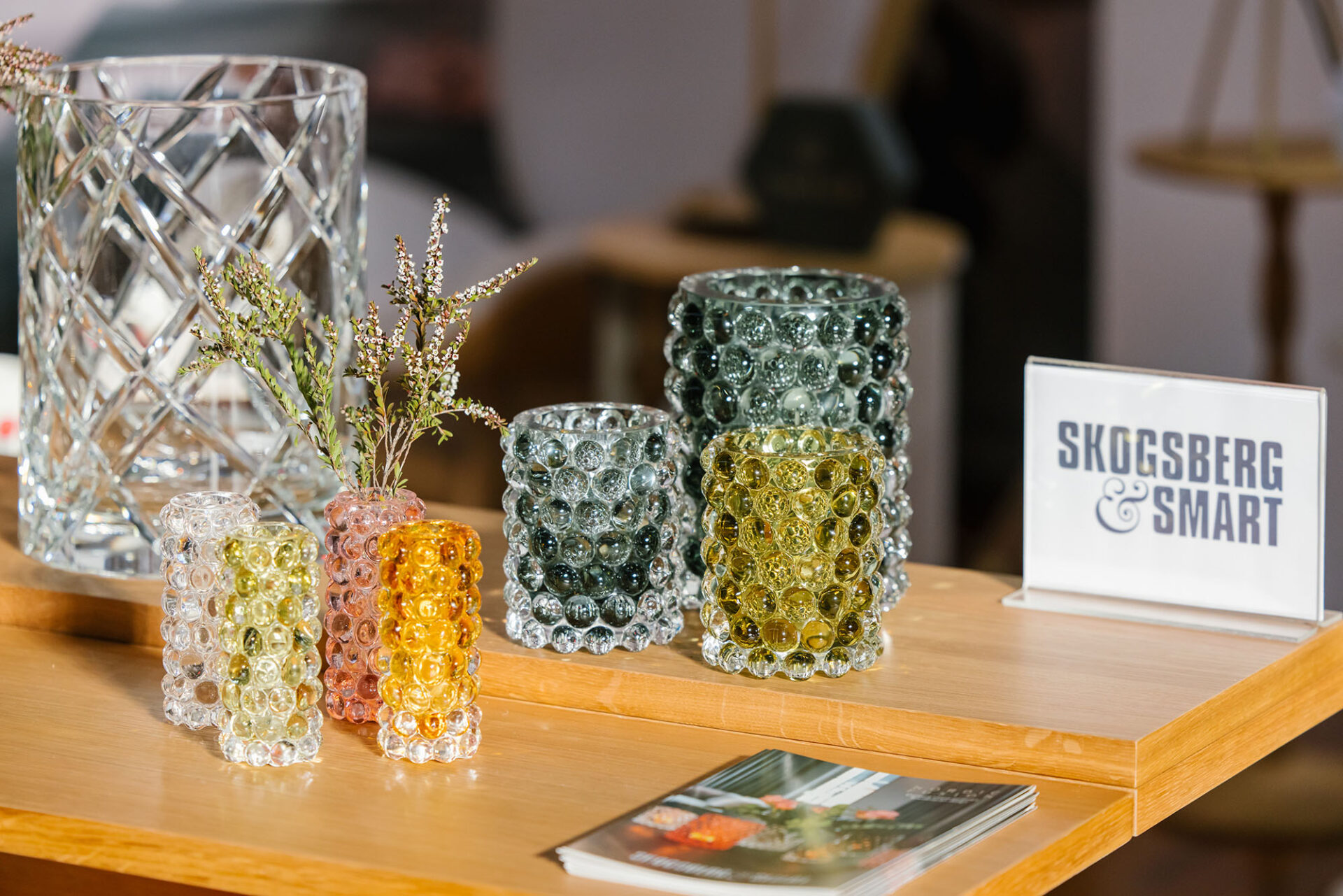Four Things We Love About Ethical Chocolate Brand Living Koko
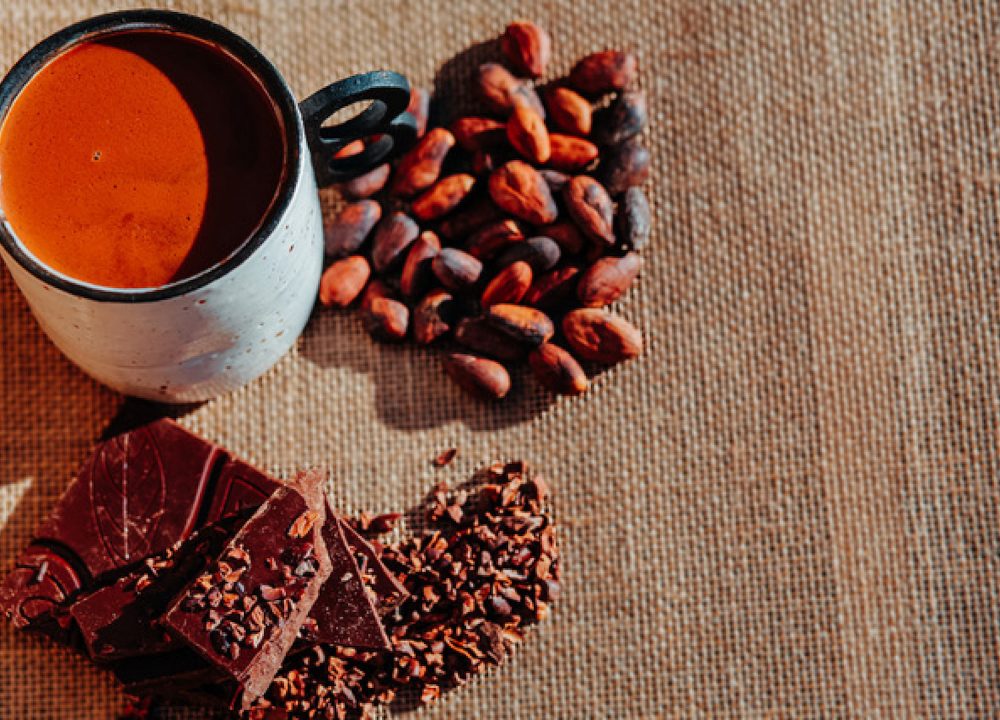
- Words by Peppermint
With a focus on food sovereignty and transparent supply chains, Melbourne-based cacao lovers Living Koko are a zero-waste, values-led organisation that supports the farmers in Samoa who are seeking to develop their cacao cash crop as a sustainable, current and future income stream to benefit their family and community.
Cacao is in the blood of co-founder Phoebe Preuss – her grandfather created the Lafi7 cacao bean – and today she and the team create small-batch, bean-to-bar chocolate and bespoke cacao products, made of the richest beans from the Samoan Islands.
Supporting Pacific Island communities with a distinct seed-to-community approach, here are four things we love about the brand.
Shared Values Underpin the Entire Supply Chain
“It can take up to three years for a cacao tree to mature enough to produce her own fruit, her own seeds,” Phoebe shares. “With the right kind of care and relationships, she ends up having the capacity to continue producing fruits until she reaches 100 years of age. The importance of her relationships starts from the moment that she’s planted, similar to us as people. Our relationship to our mother and our mother’s relationships to food and the environment, all become so important from the moment that we’re planted within our mothers.
I am activating my own cultural identity, connecting to family lands back home across the Pacific, and also to our long lineage and history within cacao.
“I am a Samoan Indigenous woman and my work through Living Koko has allowed me to actually realise that my generational relationships – that is the decisions and experiences of my ancestors – have really positioned me and in turn continue to support Glen Reiss (co-owner) and my journey with Living Koko. I am activating my own cultural identity, connecting to family lands back home across the Pacific, and also to our long lineage and history within cacao. This ongoing responsibility also ensures these kinships are approached with respect and reciprocity through a shared value approach. The shared valued approach is what really underpins Living Koko.”
The Brand Honours ‘Papa’ from Seed to Bar
“In respect to the reciprocity from cacao to community, we have to recognise that these are important circular relationships with ‘Papa,’” Phoebe says. “Papa is our word for Earth. For Living Koko, Papa and community need to be in a circular relationship. It’s our responsibility as bean suppliers, chocolate makers, food producers and consumers to take a deeper look at our food systems – the journey of our food. We need to look at the whole picture, the holistic view of the journey and value that chain.
It’s our responsibility as bean suppliers, chocolate makers, food producers and consumers to take a deeper look at our food systems – the journey of our food.
“A lot of people only see the ingredients. Never questioning where did this ingredient come from? Who’s cultivating that ingredient and what process do they follow? Are the farmers being respected? Are they being paid enough and honoured enough to look after the land in the best way possible? Or are our western-based practices in essence not supporting them, and therefore not allowing them to support Papa, encouraging them to bring in chemicals and trying to grow things in a fast way?
There is a Respectable Trade Approach
“In our time, we note that many government responses to support the South Pacific communities revolve around providing aid funding for projects,” she shares. “While this is important, like most projects they have a beginning and end. There is an opportunity for businesses in countries like Australia, New Zealand and larger countries also within the Pacific community, to build respectful, long-term relationships with producers in the islands. Such relationships lay the food sovereignty and sustainable business foundations we think all parties can value.”
From Seed to Bar, Family Comes First
“The seed has an aunty relationship with the coconut tree,” Phoebe says. “When we take the seed, we use the cacao pod. We mulch the cacao pod and we also mulch the husk of the coconut tree. Then it’s like a 50/50 blend that we mix together and that’s what the seed goes into. It’s almost like mama and the auntys come together to help it sprout. When it gets to six months, it’s a couple of feet tall and we look to planting her into the ground, back into Papa.
Speaking about cacao for us is like talking about a family member – one that we really care about deeply.
“She needs to be planted underneath the coconut trees and then it takes three years for the cacao to fruit, to bear her own seeds. That’s when we start harvesting. We can harvest right up to 100 years of age, sometimes more. There’s a specific way that you pluck the fruit to not damage the tree. And then we ferment it for seven days. Previously, we used to weave baskets, break the pod and put the cacao in there. Every day, we’d move these baskets, to get air circulation for the fermentation process to keep going. Now we’re using bigger wooden boxes with holes in them, but we still have to go in there and move the cacao to make sure that it’s all fermenting evenly. Then we move it to be sun-dried, and that can take one to two weeks. Here we’re trying to get as much moisture out of the bean for exporting and also for flavours when we roast. As someone whose family has cultivated cacao for generations, that kind of knowledge is just second nature to me and a lot of stuff is learned via osmosis and seeing things done and being part of it. Moving to Melbourne and starting Living Koko six years ago, the creation of chocolate was something very, very new to me. Understanding the marketing, creating a business, and trying to get your brand out there, I soon realised that there were different ways to approach this. And that was to start with being really authentic. We are authentic from the very beginning. Speaking about cacao for us is like talking about a family member – one that we really care about deeply.”
THIS ARTICLE WAS CREATED IN PARTNERSHIP WITH OUR FRIENDS AT LIVING KOKO. SHOP THEIR ENTIRE RANGE AND LEARN MORE ABOUT THE BRAND’S WORK HERE.
JOIN OUR MAILING LIST
Brighten up your inbox with our not-too-frequent emails featuring Peppermint-related news, events, competitions and more!
explore
More articles
Look, I don’t want to make anyone panic but IT’S DECEMBER!!! If you’re planning to give homemade gifts, you’re going to have to act fast. …
Hang out with us on Instagram
“In the 1940’s, Norwegians made and wore red pointed hats with a tassel as a form of visual protest against Nazi occupation of their country. Within two years, the Nazis made these protest hats illegal and punishable by law to wear, make, or distribute. As purveyors of traditional craft, we felt it appropriate to revisit this design.”
Crafters have often been at the heart of many protest movements, often serving as a powerful means of political expression. @NeedleAndSkein, a yarn store in Minnesota, are helping to mobilise the craftivists of the world with a ‘Melt The Ice’ knitting pattern created by @Yarn_Cult (with a crochet pattern too), as a way of peaceful protest.
The proceeds from the $5 pattern will go to local immigrant aid organisations – or you can donate without buying the pattern.
Raise those needles, folks – art and craft can change the world. 🧶
Link in bio for the pattern.
Images: @Gather_Fiber @NeedleAndSkein @a2ina2 @KyraGiggles Sandi.204 @WhatTracyMakes AllieKnitsAway Auntabwi2
#MeltTheIce #Craftivism #Knitting #CraftForChange

TWO WEEKS TO GO! 🤩
"The most important shift is moving from volume-led buying to value-led curation – choosing fewer, better products with strong ethics, considered production and meaningful stories. Retailers have real influence here: what you buy signals what you stand for. At Life Instyle, this means using the event to discover and invest in small-scale, planet-considerate brands that align with your values and your customer’s conscience. Consumers don’t need more things; they need better things, and retailers play a key role in selecting, contextualising, and championing why those products matter."
Only two more weeks until @Life_Instyle – Australia`s leading boutique retail trade show. If you own a store, don`t miss this event! Connect with designers, source exquisite – and mindful – products, and see firsthand why this is Australia’s go-to trade show for creatives and retailers alike. And it`s free! ✨️
Life Instyle – Sydney/Eora Country
14-17 February 2026
ICC, Darling Harbour
Photos: @Samsette
#LifeInstyle #SustainableShopping #SustainableShop #RetailTradeEvent

Calling all sewists! 📞
Have you made the Peppermint Waratah Wrap Dress yet? Call *1800 I NEED THIS NOW to get making!
This gorgeous green number was modelled (and made) by the fabulous Lisa of @Tricky.Pockets 🙌🏼
If you need a nudge, @ePrintOnline are offering Peppermint sewists a huge 🌟 30% off ALL A0 printing 🌟 when you purchase the Special Release Waratah Wrap Dress pattern – how generous is that?!
Head to the link in bio now 📞
*Not a real number in case that wasn`t clear 😂
#PeppermintWaratahWrapDress #PeppermintPatterns #SewingPattern #WrapDress #WrapDressPattern

8 Things to Know About January 26 - from @ClothingTheGaps:
Before you celebrate, take the time to learn the truth. January 26 is not a day of unity it’s a Day of Mourning and Survival for Aboriginal and Torres Strait Islander peoples.
It marks the beginning of invasion, dispossession, and ongoing colonial violence. It’s time for truth-telling, not whitewashed history.
Stand in solidarity. Learn. Reflect. Act.
✊🏽 Blog written by Yorta Yorta woman Taneshia Atkinson.
🔗 Link in bio of @ClothingTheGaps to read the full blog
#ChangeTheDate #InvasionDay #SurvivalDay #AlwaysWasAlwaysWillBe #ClothingTheGaps

As the world careens towards AI seeping into our feeds, finds and even friend-zones, it`s becoming increasingly hard to ignore.
We just wanted to say that here at Peppermint, we are choosing to not print or publish AI-generated art, photos, words, videos or content.
Merriam-Webster’s human editors chose `slop` as the 2025 Word of the Year – they define it as “digital content of low quality that is produced usually in quantity by means of artificial intelligence.” The problem is, as AI increases in quality, it`s becoming more and more difficult to ascertain what`s real and what`s not.
Let`s be clear here, AI absolutely has its place in science, in climate modelling, in medical breakthroughs, in many places... but not in replacing the work of artists, writers and creatives.
Can we guarantee that everything we publish is AI-free? Honestly, not really. We know we are not using it to create content, but we are also relying on the artists, makers and contributors we work with, as well as our advertisers, to supply imagery, artwork or words created by humans. AI features are also creeping into programs and apps too, making it difficult to navigate. But we will do our best to avoid it and make a stand for the artists and creatives who have had their work stolen and used to train AI machines, and those who are now losing work as they are replaced by this energy-sapping, environment-destroying magic wand.
Could using it help our productivity and bottom line? Sure. And as a small business in a difficult landscape, that`s a hard one to turn down. We know other publishers who use AI to write stories, create recipes, produce photo shoots... but this one is important to us.
`Touch grass` was also a Merriam-Webster Word of the Year. We`ll happily stick with that as a theme, thanks very much. 🌿

If your fingers are twitching for some crafting, take a peep at this massive list of marvellous makes that can be whipped up in a flash, put together by our Sewing Manager Laura. Ok yes, it was originally a roundup we created for easy Christmas gifts, but now it can be your blueprint for easy craft wins to go on your 2026 making must-do list!
If money and time are slim for you right now – as they are for many of us – these 22 projects will help you avoid the chaos and consumerism of the malls, scratch that creative itch and produce a fun me-made make that won’t break the bank.
Link in bio! 🪡🎨✂️
#PeppermintMagazine #MeMadeGifts #DIYs #EasyWins

